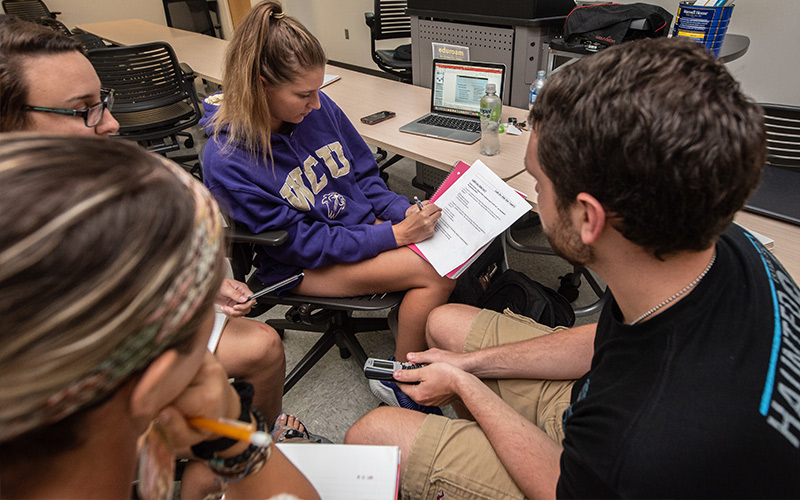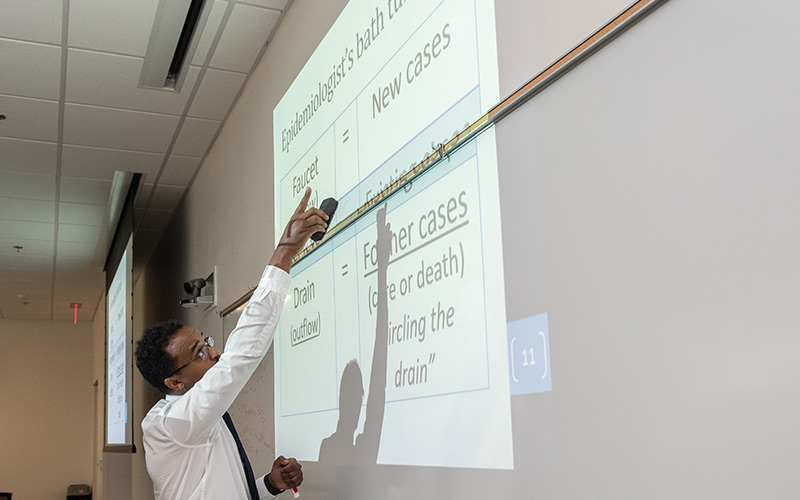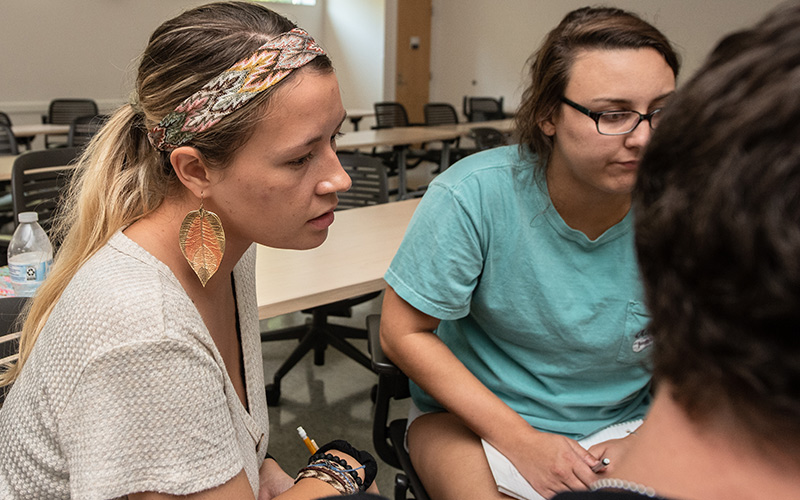An Innovative Cross Discipline Degree Program

The College of Health and Human Science's Integrated Health Sciences degree is an adaptable program for students planning to seek careers or advanced degrees in the health field, and accommodating for those still determining their future paths.
Degree options include 24-credit-hour concentrations in health management, health and wellness, and pre-professional tracts, while the core curriculum covers different health and medical components. Integrated Health Sciences students also participate in a learning lab exercise as a part of their studies.
Graduates in the program will be able to work effectively and efficiently within a complex and evolving health care environment that supports local, regional and national jobs that serve a variety of health needs.
“This is the type of innovative curriculum that our WCU faculty develop to attract, retain and graduate students who will be contributing citizens and make a difference in their communities,” said then-Provost Alison Morrison-Shetlar. “I could not be more proud of the faculty collaboration across disciplines that resulted in this one-of-a-kind major. The students who graduate from this major will be the first choice for any graduate school or job that they wish to pursue.”
The School of Health Sciences began the new collaborative program to prepare students for a complex and evolving health care environment, said Ericka Zimmerman, director of the school and associate professor.
“It’s a 120-credit hour, residential program designed for students who have a broad-based interest in the health field,” Zimmerman said. “The overwhelming response has been positive – from students, faculty and our community partners. The program is another example of how the School of Health Sciences is meeting the school’s mission of developing exceptional health professionals. Our faculty bring a passion and expertise for an integrated approach to health and the needs of our communities to address the social determinants of health.”
“This innovative and flexible program of study is intended to equally serve entry-level and transfer students. The degree also may be an attractive option for students with associate degrees wanting to earn a four-year bachelor’s degree,” said Doug Keskula, dean of the College of Health and Human Sciences. “Our culturally competent graduates will be prepared to fill various roles that support healthy living across diverse populations in businesses, community organizations and numerous support positions throughout the health care industry.”
The interdisciplinary aspect of the program incorporates faculty expertise with courses from the College of Education and Allied Professions, College of Arts and Sciences, College of Business, and the College of Health and Human Sciences. Keskula said WCU graduates in the program will be able to work effectively and efficiently within a complex and evolving health care environment that supports local, regional and national jobs that serve a variety of health needs.

“A degree in integrated health sciences could be used as a springboard for entering various graduate school programs including medical school, physical therapy, occupational therapy, nursing and physician’s assistant,” said Brook Alemu, assistant professor in the program and instructor of “Principles of Epidemiology.” “The increasing popularity of the major among our students is mainly due to the flexibility and interdisciplinary nature of the program.”
WCU’s core courses in the integrated health sciences program focus on the Institute of Medicine’s core competencies: patient centered care, interdisciplinary teams, evidence-based practice, quality improvement and utilization of informatics.
The major appealed to McKenna Stevens, a senior from Raleigh, because of that flexibility and post-graduation options it provides. “I have always thought about the administrative aspect of health care,” she said. “But, I was unsure of how to pursue it until this major came along.”
The program features interdisciplinary course work that includes instruction in epidemiology; health behaviors; statistics; population, community and personal wellness; disease prevention; and health care policy and economics.
“The thing that was most appealing to me about the major is that you can do so much with it,” said Brianna Plummer, a senior in the program from Shelby. “It opens up opportunities for graduate school and other professions. With not exactly knowing what I want to do, this major has taught me about all aspects on health care. I have learned so much and have thoroughly enjoyed all of my classes.”

Plummer was among seven seniors recently preparing for their capstone project ― a service learning undertaking that provides real-world, hands-on experience ― in a course taught by Patrick A. Baron, assistant professor and program director in Health Sciences. In coordination with WCU’s Center for Community Engagement and Service Learning, the students will collaborate with Haywood Pathways Center, a nonprofit that operates a community kitchen, transition house, family assistance and emergency shelter in the Hazelwood neighborhood of Waynesville. A new in-demand service at the center is an opioid assistance program.
“Just as not everyone in the integrated health sciences program is here for the same reason, neither are the people being served at Pathways, which makes this engagement of matching their needs and ours as close to ideal as anything could,” said Baron. “You’ll find a complex organization working with complex problems, with roles that are similarly complex. But the goals and end results should be simple: helping others and learning from the experience.”
Lane Perry, executive director of the Center for Community Engagement and Service Learning, outlined the history of Pathways origins, the partnership with the university and explained some of the things the students could expect to experience while working in a far-from-routine heath care environment.
“As another of the many collaborative aspects of the course work in integrated health sciences, this is an example of an experience that will afford students an opportunity to apply a particular discipline and talents to a very real situation that our community faces,” Perry said.
Discover More About WCU
Western Carolina Univeristy's Integrated Health Sciences (IHS) degree program is designed for students that have an interest in the medical field but may be unsure of which medical career path is right for them.

The core curriculum teaches you about different medical components, as well as inter-professional collaboration and the interpersonal relationships with the patients or clients with a special emphasis placed on promoting cultural competency and sensitivity for the needs of underserved populations.
The three available concentration options allow you to focus on an area of interest in either Health Management, Health and Wellness or Pre-Professional.

